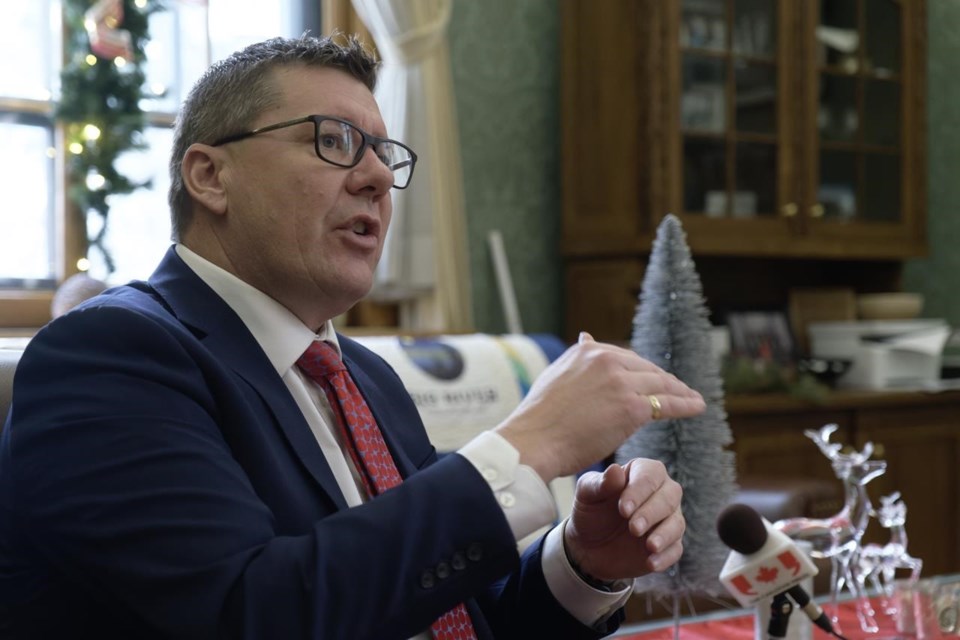REGINA ‚Äî Premier Scott Moe says he plans to run in the next provincial electionand wants to turn Saskatchewan into a leader in the west for decades to come.¬Ý
In a recent year-end interview with The Canadian Press, the Saskatchewan Party premier said he wasn't always trying work hand-in-hand with Alberta. And he believes that in the past year Saskatchewan has emerged as a leader on the Prairies.
The province has been reasserting its provincial autonomy, he said. And there have been record investments in its sustainable energy sector.
"I don't think it's about trying to stand out from one province or another. We will align … because of the industries that we have.
"However, at the end of the day, I'm not the premier of Alberta. I'm the premier of Saskatchewan."
Moe said he plans to run again in the next provincial election, slated for 2024.
As the longest serving current premier among theprovinces and territories, Moe describes himself as an "old dog in the pound." But some polls have shown that he's more popular than the country's 12 other premiers.
He calls some of them close friends, including Ontario premier Doug Ford. He's also tight with former Alberta premier Jason Kenney and former British Columbia premier John Horgan, with whom he still texts.
The friendships grew out of the Council of the Federation where, as former chair, Moe arranged virtual weekly meetings throughout the COVID-19 pandemic, a departure from the council's annual meeting.¬Ý
"Collectively, we represent all Canadians, and so there's some good friendships that have come out of that," Moe said.¬Ý
He has a salmon that New Brunswick Premier Blaine Higgs caught on a fishing trip. It's in a freezer at Moe's condo in Regina.¬Ý
In June, Moe said he quietly, and on his own dime, flew to Toronto to celebrate Ford winning a second term for the Progressive Conservatives. Moe said he did it to support his friend.
Meanwhile, he has yet to meet the premier of his western neighbour in person.¬Ý
But Moe said he has spoken with Alberta Premier Danielle Smith on the phone since she won leadership of the United Conservative Party and took over from Kenney.¬Ý
He said they have not talked about her flagship Alberta Sovereignty Within a United Canada Act, which she says would be used to resist federal government intrusion in areas of provincial authority under the Constitution.¬Ý
Smith has used a photo of Moe on Twitter to promote the legislation, saying the provinces share a "pushing back Ottawa" stance.
"I haven't looked at the bill," Moe said of the contentious Alberta legislation that passed earlier this month.¬Ý
When Saskatchewan introduced its own sovereignty legislation, Justice Minister Brownyn Eyre made it clear the bill "is ours and ours alone."
Moe has said he offered to forward Smith a copy of the Saskatchewan First Act, which aims to unilaterally amend the Constitution to reassert the province's jurisdiction over its natural resources.
He said Saskatchewan didn't collaborate with Alberta but with "Saskatchewan people and what they wanted to see."
Moe, who has deleted all social media apps from his cellphone to improve his mental health, said he stays connected with people by touring the province, hosting town halls and meeting regularly with his caucus.¬Ý
The government introduced other bills this year that combat what it considers federal intrusion.
One bill would ban municipalities and police services from participating in the federal government's proposed firearm buyback program. There's also a bill that would create a provincial marshal service and one that would allow Saskatchewan to start collecting corporate income taxes.
"When (federal) policies come forward ‚Ķ that are harmful to how we create wealth, how we employ our citizens, how we grow as a province ‚Äî we find that frustrating," Moe said.¬Ý
His stance on provincial autonomy has gained scrutiny from the public as well as First Nation groups that say they want to be consulted.
But Moe says the issue shouldn't be polarizing.¬Ý
"People can think what they will of the various acts … that we put in place as a government, whether they're supportive or would dismiss them," Moe said.
"But the fact of the matter is the government that's introducing them has a true belief that they are in the best interest of Saskatchewan residents, not just those that live here today, but those that will live here 10 and 20 and 30 years from now."
This report by The Canadian Press was first published Dec. 23, 2022.
Mickey Djuric, The Canadian Press




